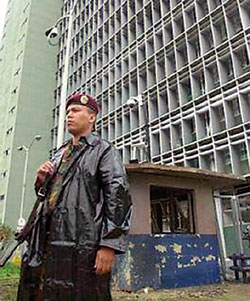|
Vol. 225 No. 3 |

|
 |
| MAYRA RODRIGUES VALLADARES, CONTRIBUTING EDITOR, SOUTH AMERICA |
According to credit ratings agency, Fitch Ratings, Latin America's oil and gas sector will need more than $225 billion of investment over the next decade. This year could mark the beginning of serious investment, possibly leading to significant discoveries and production. Repsol-YPF, in particular, has begun the year with announcements of serious intentions for South American E&P investment.
Venezuela focuses on exports this quarter. During the third week in January, the US National Security Council met to discuss a more aggressive policy toward Venezuela, including possible economic sanctions. The sanctions would be aimed at state oil company PDVSA. If such an action were to be taken, it would likely impact PDVSA's US-based refiner/ marketer subsidiary, Citgo Petroleum Corp.
Moody's maintained its Caa1 rating on Venezuela for foreign currency country ceilings. This was done to “reflect the deep and long-lasting impact on the country's foreign-currency earning capacity, due to an oil strategy aimed at maximizing the government's near-term share of oil revenues.” This year, PDVSA will remain embroiled in politics. President Hugo Chavez's opponents will try to push through a referendum on his presidency. Also, the stringent Hydrocarbons Law is likely to discourage new contracts with foreign companies.
 |
Symbolizing Venezuela's political strife, a soldier stands guard outside the offices of state oil company PDVSA.
|
|
Relations between the US and Venezuela have deteriorated significantly. However, there may soon be a strengthening of relations between Russia and Venezuela. On February 9, Russian Deputy Prime Minister Vladimir Yakovlev discussed the exploration and development of oil and gas fields in Venezuela during a visit. Also on the agenda were discussions about constructing a network of pipelines to supply gas to the public, as well as projects to repair and work over oil wells and increase reservoir yields.
Despite political difficulties, PDVSA's Eastern Division plans to increase production this year by 170,000 bopd, to 1.28 million bopd. This is considered a very aggressive drilling plan, because the division will have to gear up to using 65 rigs during the year, from an average of 52 that it has been operating.
Brazil's Petrobrás will issue $2.4 billion of debt to finance expansion plans. In 2003, Petrobrás raised its domestic crude output by nearly 3%, to an average 1.54 million bpd. However, output was below the 1.59-million-bopd target. A number of problems, including rig availability, kept Brazil from reaching its goal. Petrobrás' foreign oil production was relatively stable, at an average 160,900 bopd, representing a very significant increase over the 35,300 bpd produced in 2002. The increase was due largely to the inclusion of output from Argentina's Perez Companc. Petrobrás had previously bought the Argentine firm.
Petrobrás increased its 2004 capital expenditures budget to $8 billion from $7.2 billion in 2003, particularly for the E&P, gas and petrochemicals businesses. Reportedly, Petrobrás hopes to spend $600 million a year on E&P. The company's strategy is to increase oil production by about 8% annually.
Ecuador could get badly needed investment in the very near future. Repsol-YPF said that it will invest $58 million in exploration and production in Ecuador this year, a 17% increase from 2003. Also promising to invest a similar amount of funds is Noble Energy. The company announced that it would invest $55 million in Ecuador, to drill one sidetrack and up to three development wells on its offshore Amistad gas field. Noble management hopes to increase gas production to supply its Machala gas-fired power plant through 2010.
Smaller players are also investing in Ecuador. Argentine oil company Tecpetrol bought the terms of a tender offer for the concessions to produce oil in four fields in the Ecuadorian Amazon. The four fields have total estimated reserves of 904 million bbl.
Repsol-YPF is also in a Peruvian expansion mode. Together with Burlington Resources, Repsol-YPF will sign an E&P contract for Block 57 in the Ucayali basin. Repsol-YPF will operate the block with a 76.2% stake, and Burlington will hold the remaining 23.8% interest. This is similar to the contract for Block 90 that was signed in December 2003. The block's work program requires roughly a $45-million investment over the next seven years. Also, according to Spanish newspaper, Gestion, Repsol-YPF will focus on Blocks 57, 90, 80 and 39 this year, as an important part of its upstream strategy in Peru.
Perupetro hopes to receive approval from the Ministry of Energy for contracts on Blocks 100 and 101 in the Maranon basin with local company Compania Consultora de Petroleo (CCP) and Occidental, respectively. Perupetro said that it wanted to sign the Block 100 contract with CCP in February or March, and the contract with Occidental at some time thereafter. Perupetro plans to sign at least six E&P contracts during 2004.
Chilean expansion. In what is being billed as state firm ENAP's largest investment into the petroleum sector, the company announced in January that it will invest $334 million in 2004. Private sector partners will invest a further $90 million in joint projects.
Half of the funds ($166 million) are earmarked for E&P work. Of that amount, $43 million will go to exploration and $123 million is destined for development. ENAP hopes to spend $49 million on Chile's only production area, Region XII. This investment would be almost twice as much as last year. 
Mayra Rodríguez Valladares is president of New York-based MRV Associates Inc. (www.MRVAssociates.com). She is a regular contributor to this column.
|





